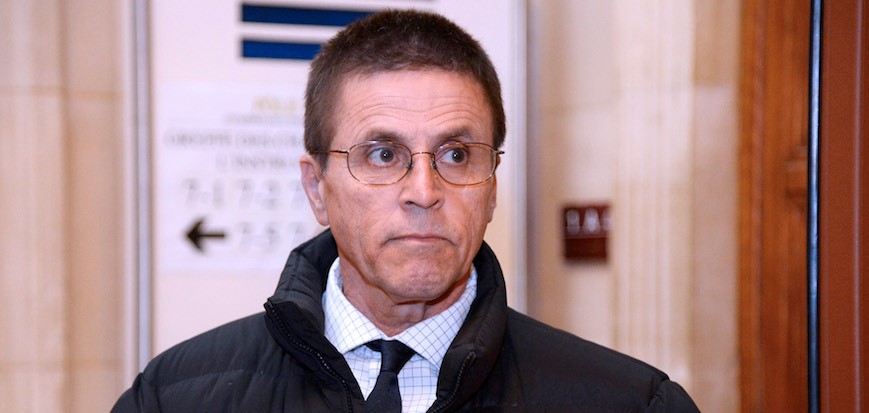A former part-time instructor at Carleton University, whose conviction in absentia for a 1980 Paris synagogue bombing has drawn widespread attention, is not teaching at the institution this semester according to a university spokesperson.
“Hassan Diab is a former part-time contract instructor who taught a course at the university last fall,” Steven Reid, the media relations officer at the school in Ottawa, wrote in a statement to The Canadian Jewish News. “He is not in the employment of Carleton.”
Reid did not disclose any further details, stating privacy considerations.
Diab’s employment at Carleton—last semester he headed a course called Social Justice in Action—sparked controversy both domestically and internationally.
Convicted in absentia in 2023 by a French court for his alleged role in a bombing of the Rue Copernic synagogue in Paris, which killed four people and injured 46 more, he has maintained his innocence throughout—claiming he was in Lebanon at the time of the attack.
The Canadian government’s refusal to extradite Diab back to France remains a focal point of the ongoing legal and diplomatic discussions.
B’nai Brith Canada, which has been vocal about Diab’s employment, applauded Carleton for what it described as a “necessary step” in ending his role at the university, although there is no confirmation that Diab won’t return.
“Diab’s employment as a lecturer was a betrayal of the Canadian values of justice, safety, and accountability,” B’nai Brith stated on Jan. 10. “This decision is an important acknowledgment of the need to ensure our educational institutions prioritize the well-being and academic success of their students.”
Following B’nai Brith’s well-publicized advocacy, @Carleton_U has confirmed that Hassan Diab—a man convicted of terrorism-related charges in France for his role in the 1980 Paris synagogue bombing that killed four and injured dozens—is no longer employed at the institution.
— B'nai Brith Canada (@bnaibrithcanada) January 10, 2025
For… pic.twitter.com/J0Sj880FVO
B’nai Brith also reiterated its support for Diab’s extradition to France: “We remain steadfast in our mission to combat hate and antisemitism and ensure that justice is upheld.”
Speaking anonymously, one Jewish student at Carleton told The Canadian Jewish News there is speculation about whether the university’s decision was related to low enrolment numbers for Diab’s course, or broader pressure stemming from advocacy efforts.
“Many of us, like myself, are planning on taking a wait-and-see approach to see if he’s back in the hall,” the student said.
“I would like to know what happened,” he added, citing uncertainty as to whether Diab’s contract was terminated or never issued for the winter semester. I think a lot of other students would like to know as well.”
Iddo Moed, the Israeli ambassador to Canada, has also been lobbying for Carleton to take action.
More than 4 decades ago, 4 innocent lives were taken and 46 more wounded by a blast outside of a French synagogue.
— Iddo Moed 🎗️ (@MoedIddo) November 14, 2024
Today, the culprit and convicted terrorist Hassan Diab haunts the halls of @Carleton_U as a supposed expert in “Social Justice in Action”, as the title of his… pic.twitter.com/MrhenYuL1b
“We came to the conclusion that a respectable academic institution that allows a terrorist to be a teacher and give a course on their premises is principally wrong that we have to make the public aware,” Moed said in an interview with The Canadian Jewish News.
Moed further elaborated on his personal connection to the case in a Nov. 13 opinion piece for the National Post. Aliza Shagrir, the mother of his colleague Hagai Shagrir—head of the Asia-Pacific Division of the Israeli Ministry of Foreign Affairs—was one of the victims of the 1980 Copernic synagogue bombing.
In his commentary, Moed wrote that Shagrir was “the mother of my friend and colleague, Hagai, a teenager at the time who survived only because he had returned early to his hotel room. To this day, Hagai remains traumatized and laments having gone through life without his mother.”
In November, nine public research universities in Israel—coordinated by the Association of University Heads of Israel—collectively urged Carleton to terminate Diab’s employment. The letter, obtained by The Canadian Jewish News, described the hiring “betrayal of academic values” and a failure to uphold justice.
“How can an institution dedicated to instilling moral principles in its students justify appointing someone convicted of such serious crimes to a teaching position?” the letter asked. “This hiring decision crosses a clear ethical line.”
The Canadian Jewish News reached out to Hassan Diab’s lawyer for comment on the situation but did not receive a response.
Moed has also been vocal about the broader implications of Diab’s case, particularly its impact on universities and Jewish communities.
“We see not only Hassan Diab, but we see other figures who have very clear anti-semitic agendas appearing in universities and speaking freely, as if what they are presenting is the reality, and it is entirely flawed and wrong,” he said.
“Presenting their reality, a distorted reality, as a fact, and starting the discussion from there is, of course, wrong. And so when we are talking to university leaders around the country, I’m speaking not just about the encampments and all this intimidating behaviour that has been experienced by Jewish students there.”
The Copernic Affair, a Canadaland podcast miniseries about the circumstances surrounding the case of Hassan Diab, is set for release on Jan. 22.
Author

Mitch is The CJN's campus and education reporter based in Toronto, Ont. He has a passion for investigative research, long-form feature writing and digital journalism. His book, Home Safe, was published by Dundurn Press in November 2022.
View all posts








